#PostChristian
Text
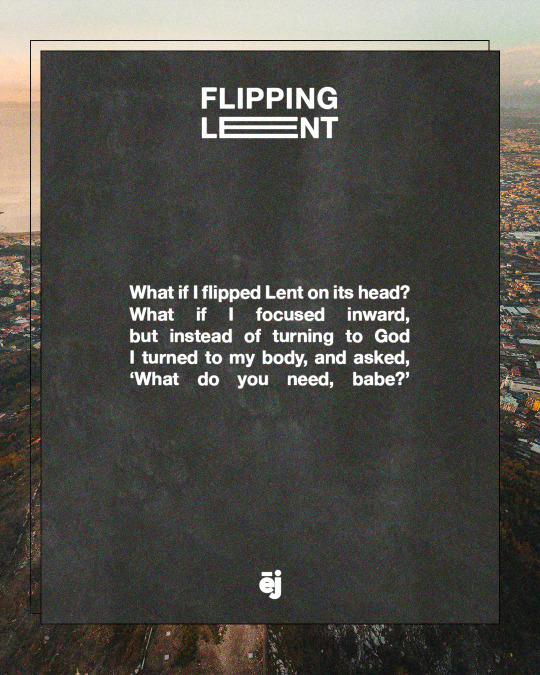
A highlight from tomorrow’s piece, “Flipping Lent” // volume 18
#deconstruction#exvangelical#deconvert#ex catholic#post christian#catholic#post catholic#christian#excatholic#exchristian#christianity#religious trauma#catholicism#ex christian#postchristian#deconstructed club#deconversion#lent
13 notes
·
View notes
Link
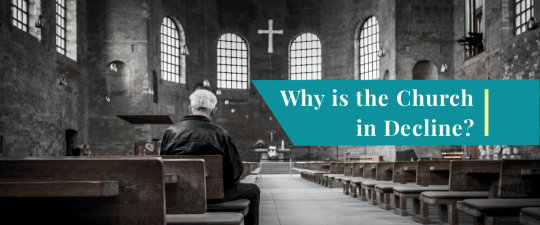
#Church#Census2021#Christianity#Christian#Religion#UKChurch#GoodNews#DrJohnHayward#PostChristian#CofE#ChurchOfEngland#ChristianCountry#Religious#ChristianityinDecline#Faith#CurrentEvents#ReadTheBible#BiblicalChristianity#BibleBelieving#ByFaithMedia#ByFaith#Backholer#PaulBackholer#ChristianArticle#BiblicalThinking#News#ChristianThoughts#ReligiousLeaders#ChurchinDecline#churchfamily
1 note
·
View note
Text

western women get a lot of flak for being too independent or "masculine" but it always makes me think of spartan women. i think about that quote: "why are spartan women the only women who rule their men" and queen gorgo says it's because "spartan women are the only women who give birth to real men." i think plutarch also mentions that spartan men were always obedient to their wives.
or as socrates put it (quoted by xenophon): "It is the example of the rider who wishes to become an expert horseman: 'None of your soft-mouthed, docile animals for me,' he says; 'the horse for me to own must show some spirit' in the belief, no doubt, if he can manage such an animal, it will be easy enough to deal with every other horse besides. And that is just my case. I wish to deal with human beings, to associate with man in general; hence my choice of wife. I know full well, if I can tolerate her spirit, I can with ease attach myself to every human being else."
and i think there's a lot of truth to this. i think cultures with spirited, independent women are made stronger by it, for a number of reasons. and i think it actually plays a major role in western civilization's success. a strong-willed man and a strong-willed woman working together in union is an incredibly strong foundation for a family and a civilization.
and i don't want to give the impression that the west was ever some kind of gender-egalitarian utopia. but i do think a significant degree of respect for women is a common feature in western civilization (and i'd say broader indo-european culture too). at least compared to other civilizations. and especially in the prechristian and, now, the postchristian eras (though i'd say it even bleeds through in the christian era in some ways too). i mean there's a reason why feminism first blossomed in the west and not elsewhere.
but yeah, this desire for some docile, obedient slave-wife seems to be very contrary to the spirit of western civilization. i mean, it seemed like the default view of women in prechristian europe, for better or worse, was that women were these wild, powerful, passionate, promiscuous creatures who needed to be tamed. and yes, women were expected to be loyal and amenable/agreeable to their husbands but this is hardly unreasonable and is a far cry from the obedient slave-wife some people propose as an ideal (namely traditional christians and muslims and the like).
"women should be banned from doing manual labor" -- traditionally, women did all sorts of manual labor. medieval peasant women would be working in the fields just like the men. and even if they weren't working a field there would be plenty of other physically taxing jobs they'd be doing. not saying that women should be encouraged to do extremely dangerous or physically taxing jobs, but if they're able to more power to them. and i kinda detest this desire to portray women as frail and incapable. they are the weaker sex but they're not weak. let's not infantilize them.
also, western women generally marry out of love and commitment and view themselves (rightfully) as partners in union with their husbands. whereas these types of women (the woman who made this post) believe women's sole purpose is to be obedient little decorations who do nothing but sit around and look pretty (and maybe have babies if she's very traditional -- but often you won't even get that!) while the man just gives her money. it's transactional and superficial. there's no real love or partnership. it's not a good foundation for a family or a civilization.
anyway, belated happy women's day.
#i actually have so much more to say about this but i'd be here all day#i was also gonna talk about women in latino cultures too#and how simpish the men can be#and yet latino men are viewed as very masculine#and objectively they have some of the highest rates of testosterone#but yeah if you are latino and live around latinos then you know that their women have a reputation for being very not-submissive lmao#and yes i generally consider latin america part of western civilization#at least at the periphery of it
14 notes
·
View notes
Text
one of the effects of imperial domination having gone how it has gone in the past century is that there are people who know that "glorifying war" is bad, but they still very much want to glorify war.
this is very obvious this time of year, with all the poppy stuff except it's not just the poppy stuff anymore. the poppy stuff was a good war-glorification containment strategy while it lasted, and by "it" i mean the people who fought in the Great War, but the last one of those died more than a decade ago.
part of the failure of the containment strategy is that yesterday i saw the unedifying sight of a "post-war" boomer making the mistake of posting *all three stanzas* of the poppy poem.
the general 20th century understanding of the poem, central to the cult, is you read it
In Flanders' fields the poppies blow
Between the crosses, row on row,
That mark our place: and in the sky
The larks, still bravely singing, fly
Scarce heard amid the guns below.
We are the dead. Short days ago
We lived, felt dawn, saw sunset glow,
Loved and were loved, and now we lie
In Flanders' fields.
*mumble mumble mumble and here is the Queen Mother laying a wreath on the cenotaph*🎺📯💂♂️💂♂️💂♂️💂♂️💂🏿💂♂️
We shall not sleep, though poppies grow
In Flanders' Fields.
or
In Flander's field the poppies grow
something crosses in a row
Larks still bravely singing fly
something something something die (?)
We are the dead.
something something
in Flander's fields
something something
we shall not sleep though poppies grow
in Flander's field
The mumbled section reads:
Take up our quarrel with the foe;
To you from failing hands we throw
The torch; be yours to hold it high,
If ye break faith with us who die...
The "we shall not sleep" part which, in the mumbled version, can be interpreted as vague postchristian notion about "death is a sleep but not really, i suppose they are alive if we remember them. poems don't have to make sense" becomes quite clear if you read the unmumbled part. The deathlessness is conditional on keeping the """quarrel""" going, but nobody cares even to read the poem anymore so the whole thing can be safely printed out somewhere whole.
I would say that with more than a century of distance, this hymn and its surrounding cult has gone from "bloodthirsty jingoism" to "postchristian sentiment" to "historical nonsense", and "historical nonsense" is the thread out of which future "bloodthirsty jingoism" can be woven.
11 notes
·
View notes
Text
One thing I've been reconsidering is how to relate to christianity in my practice.
So for context, I'd previously been converting to a completely different religion, so I didn't have anything to do w christianity for a good bit and I really did mentally divest myself.
When I decided to try paganism again, I kind of felt a pressure to involve christianity. Folk catholicism and christopaganism are popular, and as someone who was raised catholic I did feel like involving it would be the "done" thing. Especially because I do think for modern paganism to work, we need to move to being postchristian rather than just anti-christian.
But idk... I kind of like having the distance from christianity that I've built. It doesn't really feel like there's anything there for me. So honestly I think I'm just going to keep doing what I was doing, and avoid pulling too much christian influence into my practice. So for example no yule or ostara (since those are kind of just paganified versions of christian holidays.) No folk saints (sorry st. Guinefort).
It just feels comfortable to not have anything to do with it, and to see it entirely as "someone else's".
It's like standing next to a pool after having dried off completely. There's a bit of an expectation that you should jump in again and get wet, but I'm kind of fine being dry.
0 notes
Text
Faith (& 4)

Dear Caroline:
Continuing with the comment of your long post: it is true that Protestantism has placed a great bonus on faith (there is a reason why Sola Fide and Sola Scriptura are Reformed mottos), but one could say that they have only taken to the extreme what was already there -say, in the Pauline epistles or the theology of Augustine of Hippo-. And Christianity has been notoriously intolerant about hair-splitting, Byzantine disagreements on very minor differences in belief (the councils and heresies of late antiquity come to mind, along with Gibbon's oft quoted jest that 'the profane of every age have derided the furious contests which the difference of a single diphthong excited between the Homoousians and the Homoiousians'). But even if we are the worst offenders, I would insist that no living religion, however pragmatic and focused on acts and rituals, can subsist in the long term if its core tenets and articles of faith are no longer believed in. Christianity without the Resurrection and giving creed to Jesus' messiahhood is reduced to an empty shell (Personal Postchristianity would be an apt moniker, perhaps?) . And you yourself bear witness to this by your reference to the EA ritual you participated in and which was so meaningful to you.
Then again, in most cases, I suspect faith functions on a continuous spectrum instead of discretely, and except for an infinitesimally small set of people, believing in God is a certain probability greater than 50%. I would be willing to push the boundaries further down -let's say to the thirties- and still be willing to admit that such a person is still a limited believer, but in cases like yours or mine, I suspect the probability just borders too closely to 0.
So I find myself agreeing with your unnamed fried quite a lot, although I also find your critique of her valid, and yet I would frame it differently. You are a person of the activist sort, Caroline, which means that when you believe, you believe wholeheartedly, and give yourself away completely into the cause. From within such a mindset, it makes perfect sense to expect it to change everything and affect all your thoughts and decisions, as you say. Yet your friend's tepidness might come from a certain hedging-of-bets that comes out of the inevitable uncertainty of religious belief. Like, you might make the leap of faith -credo quia absurdum- but still be rational enough to be aware of the fragility and weak epistemic status of your beliefs, and therefore invest only partially, and all the less so in the difficult, unpleasant and unsavory consequences. It's a little bit like a hedged Pascal's Wager - if you believe in God and he doesn't exist, it is not true that you 'lose nothing', as the Frenchman said, because moulding your life around said belief and its rules will imply pain, sacrifices and numerous deprivations that will substantially decrease your individual pleasure, flourishing and quality of life in the only world there is.
Quote:
Yes; but you must wager. It is not optional. You are embarked. Which will you choose then? Let us see. Since you must choose, let us see which interests you least. You have two things to lose, the true and the good; and two things to stake, your reason and your will, your knowledge and your happiness; and your nature has two things to shun, error and misery. Your reason is no more shocked in choosing one rather than the other since you must of necessity choose. This is one point settled. But your happiness? Let us weigh the gain and the loss in wagering that God is. Let us estimate these two chances. If you gain, you gain all; if you lose, you lose nothing. Wager, then, without hesitation that He is.
Blaise Pascal
0 notes
Text

Set up an alternate advent candle set up, repost if you want to know more! #postchristian #christianwitchcraft #newyearadvent
0 notes
Photo

Posted @withregram • @christenacleveland God is a Black woman. image: Optimal Alchemy (@optimalalchemy) . . #spirituality #healing #selflove #spiritualawakening #liberation #BlackityBlackBlack #SacredBlackFeminine #GodIsABlackWoman #GodIsABlackWomanBook #feminist #feminism #blackhistorymonth #blacklivesmatter #womanist #womanism #feministbook #blackbooks #witchy #postchristian #deconstruction #exvangelical https://www.instagram.com/p/Cchb-_mrVOQ/?igshid=NGJjMDIxMWI=
#spirituality#healing#selflove#spiritualawakening#liberation#blackityblackblack#sacredblackfeminine#godisablackwoman#godisablackwomanbook#feminist#feminism#blackhistorymonth#blacklivesmatter#womanist#womanism#feministbook#blackbooks#witchy#postchristian#deconstruction#exvangelical
2 notes
·
View notes
Photo

#postchristian #christian #catholic #intellectual #mythology #science #theology #myth #christianity #history #progress #astronomy #physics #biology #medicine #pagan #hospital #doctors #charity #God #humandignity #divine #heal #sciences #reason #book 📖 https://www.instagram.com/p/CCG9wB4B-tE/?igshid=3me8c4igwqf6
#postchristian#christian#catholic#intellectual#mythology#science#theology#myth#christianity#history#progress#astronomy#physics#biology#medicine#pagan#hospital#doctors#charity#god#humandignity#divine#heal#sciences#reason#book
0 notes
Photo


Seriously though, the story of Moses is incredibly interesting. The most interesting verse to me is Exodus 11:4 NIV “So Moses said, ‘This is what the Lord says.’” BUT YALL. Moses wrote this book! HAhahahaHAA! He quotes himself in his own book. If the Bible was The Office he would be known as Moses Scott
#micheal scott quotes#the office#thebible#bibleverse#biblejournaling#biblewords#moses#readyourbible#exvangelical#postchristian#ex christian#queer christian#bible college
0 notes
Text
Flipping Lent by Luz // volume 18
Usually for Lent we are supposed to give up something for 40 days.
We are supposed to deny ourselves, and sacrifice things - food, habits, vices - that we turn to.
We are supposed to give to others in new, intentional ways.
What if I flipped Lent on its head?
Am I allowed to do that?
Who do I ask to get permission? God?
I feel weird being like, “Yo, remember me? Yeah, can I do this?”
Can I give myself things - food, habits and vices - to turn to?
All nourishing things. Money, time, and attention, to myself.
What if I focused inward, but instead of turning to God I turned to my body, and asked, ‘What do you need, babe?’
And instead of hearing what I need and ignoring it, what if I HAD to do that?
40 days.
Of not denying my body. My wants. My desires.
I need the discipline that Lent brings me.
I’m exhausted.
I’ve tended to family wounds, celebrated my friends’ milestones, supported their life transitions, and have given a lot of energy and time to my job that is people-heavy, and heart-heavy.
I don’t say this from a place of resentment or anger.
I am so glad I have them and they have me, as community is the answer.
But I do say from a genuine place, “Wow. Your girl is tired.”
Like the feeling of staying out dancing until 4 am- the next morning you are raw, sleepy, irritable, but you know it was worth it.
40 days of fasting from giving, and 40 days of not denying myself.
It’s not my natural disposition.
But what if, on April 6th,
I resurrect?

#deconstruction#exvangelical#deconvert#ex catholic#post christian#catholic#post catholic#christian#excatholic#exchristian#christianity#religious trauma#catholicism#ex christian#postchristian#deconstructed club#deconversion#lent
2 notes
·
View notes
Text
Giovani Lo Celso has shown he can be a game-changer for Tottenham in the post-Christian Eriksen era
Giovani Lo Celso has shown he can be a game-changer for Tottenham in the post-Christian Eriksen era

[ad_1]
Giovani the game changer: Lo Celso showcased his attacking credentials at Southampton and looks like the man to unpick locks for Tottenham in the post-Christian Eriksen era
Giovani Lo Celso is finally coming good for Tottenham since his summer move
And how timely with midfielder maestro Christian Erisken set to depart the club
Lo Celso showed against Southampton conclusive evidence of…
View On WordPress
0 notes
Text
Justification in a Post-christian Society (English) Paperback Book Free Shipping

Justification in a Post-christian Society Estimated delivery 3-12 business days Format Paperback Condition Brand New Description Since the Reformation in the sixteenth century, Lutheran traditions have had a great impact on culture and politics in many societies. At the same time Lutheran churches have impacted personal faith, basic morality, and ethics. Modern society, however, is quite different from the time of the Reformation. How should we evaluate Lutheran tradition in todays Western multicultural and post-Christian society? Is it possible to develop a Lutheran theological position that can be regarded as reasonable in a society that evidences a considerable weakening of the role of Christianity? What are the challenges raised by cultural diversity for a Lutheran theology and ethics? Is it possible to develop a Lutheran identity in a multicultural society, and is there any fruitful Lutheran contribution to the coexistence of different religious and nonreligious traditions in the future? ""The present volume documents that the Lutheran theological tradition is still doing well. These contributions testify to a Lutheranism not captured in the past, but actively engaging with contemporary issues in society and culture; a Lutheranism both open, self-critical, constructive, and creative. This is a must read for anybody who wants to see how the Lutheran tradition related to the wider theological dialogue, and what it has to contribute to the ecumenical reflection about the relevance of Christian faith for people of today."" —Jan-Olav Henriksen, Norwegian School of Theology, Oslo, Norway ""This volume emanating from a 2013 conference in Uppsala, Sweden on Lutheran Tradition in Transition makes a critical but not unsympathetic evaluation of the past and discusses what would be a reasonable Lutheran position in the future. Well-known Lutheran theologians, both from Europe and the USA, focus on three themes, justification, Lutheran theology and ethics, and the Reformation as a model for interpreting the present. The contributors convincingly show that Lutheran theology, though diverse in itself, still makes an important contribution to the theological discourse."" —Hans Schwarz, Regensburg University, Regensburg, Germany ""This book shows how the Lutheran doctrine of justification, despite its historical location in the 16th century—when examined with a self-critical ambition, as this book certainly does—has the capacity of challenging common values and ways of thinking, not least in societies marked by a post-Christian mentality."" —Bo Kristian Holm, Aarhus University, Aarhus, Denmark Carl-Henric Grenholm is Senior Professor of Ethics in the Department of Theology, Uppsala University, Sweden. Goran Gunner is Associate Professor in Mission Studies, Uppsala University, and Researcher at Church of Sweden Research Unit. Publisher Description Since the Reformation in the sixteenth century, Lutheran traditions have had a great impact on culture and politics in many societies. At the same time Lutheran churches have impacted personal faith, basic morality, and ethics. Modern society, however, is quite different from the time of the Reformation. How should we evaluate Lutheran tradition in todays Western multicultural and post-Christian society? Is it possible to develop a Lutheran theological position that can be regarded as reasonable in a society that evidences a considerable weakening of the role of Christianity? What are the challenges raised by cultural diversity for a Lutheran theology and ethics? Is it possible to develop a Lutheran identity in a multicultural society, and is there any fruitful Lutheran contribution to the coexistence of different religious and nonreligious traditions in the future? ""The present volume documents that the Lutheran theological tradition is still doing well. These contributions testify to a Lutheranism not captured in the past, but actively engaging with contemporary issues in society and culture; a Lutheranism both open, self-critical, constructive, and creative. This is a must read for anybody who wants to see how the Lutheran tradition related to the wider theological dialogue, and what it has to contribute to the ecumenical reflection about the relevance of Christian faith for people of today."" --Jan-Olav Henriksen, Norwegian School of Theology, Oslo, Norway ""This volume emanating from a 2013 conference in Uppsala, Sweden on Lutheran Tradition in Transition makes a critical but not unsympathetic evaluation of the past and discusses what would be a reasonable Lutheran position in the future. Well-known Lutheran theologians, both from Europe and the USA, focus on three themes, justification, Lutheran theology and ethics, and the Reformation as a model for interpreting the present. The contributors convincingly show that Lutheran theology, though diverse in itself, still makes an important contribution to the theological discourse."" --Hans Schwarz, Regensburg University, Regensburg, Germany ""This book shows how the Lutheran doctrine of justification, despite its historical location in the 16th century--when examined with a self-critical ambition, as this book certainly does--has the capacity of challenging common values and ways of thinking, not least in societies marked by a post-Christian mentality."" --Bo Kristian Holm, Aarhus University, Aarhus, Denmark Carl-Henric Grenholm is Senior Professor of Ethics in the Department of Theology, Uppsala University, Sweden. Goran Gunner is Associate Professor in Mission Studies, Uppsala University, and Researcher at Church of Sweden Research Unit. Details ISBN 1625648898 ISBN-13 9781625648891 Title Justification in a Post-christian Society Format Paperback Year 2014 Pages 272 Publisher Pickwick Publications Dimensions9 in. x 6 in. GE_Item_ID:90086383; About Us Grand Eagle Retail is the ideal place for all your shopping needs! With fast shipping, low prices, friendly service and over 1,000,000 in stock items - you're bound to find what you want, at a price you'll love! Shipping & Delivery Times Shipping is FREE to any address in USA. Please view eBay estimated delivery times at the top of the listing. Deliveries are made by either USPS or Courier. We are unable to deliver faster than stated. International deliveries will take 1-6 weeks. NOTE: We are unable to offer combined shipping for multiple items purchased. This is because our items are shipped from different locations. Returns If you wish to return an item, please consult our Returns Policy as below: Please contact Customer Services and request "Return Authorisation" before you send your item back to us. Unauthorised returns will not be accepted. Returns must be postmarked within 4 business days of authorisation and must be in resellable condition. Returns are shipped at the customer's risk. We cannot take responsibility for items which are lost or damaged in transit. For purchases where a shipping charge was paid, there will be no refund of the original shipping charge. Additional Questions If you have any questions please feel free to Contact Us. Categories Baby Books Electronics Fashion Games Health & Beauty Home, Garden & Pets Movies Music Sports & Outdoors Toys
Read the full article
0 notes
Text
Saint Judas
James Wright
When I went out to kill myself, I caught
A pack of hoodlums beating up a man.
Running to spare his suffering, I forgot
My name, my number, how my day began,
How soldiers milled around the garden stone
And sang amusing songs; how all that day
Their javelins measured crowds; how I alone
Bargained the proper coins, and slipped away.
Banished from heaven, I found this victim beaten,
Stripped, kneed, and left to cry. Dropping my rope
Aside, I ran, ignored the uniforms:
Then I remembered bread my flesh had eaten,
The kiss that ate my flesh. Flayed without hope,
I held the man for nothing in my arms.
#poetry#spy wednesday#saint judas#james wright#perhaps if judas could have had a moment like this for real he would have been saved#but it's a very human thing especially in our postchristian world to look at the most unredeemed thing and say#what if. i see myself in that. there's my hopelessness and despair.#what if they could be saved? maybe i can too#that's why i love this poem - because it's so piercingly written and bc it's about selfless love appearing in the most impossible places#for me it's not about judas himself per se as a real historical man#it's a mask poem#and when we put on this mask we realize more deeply our own unbearable sinfulness AND that we still have hope for ourselves
25 notes
·
View notes
Text
hey religious trauma/exvangelical/exchristian tumblr, have you heard of the podcast Existential Happy Hour by Micah J. Murray? i've just listened to the first couple of episodes and it's really resonating with me so far! so much of what he describes about the constant trauma and guilt of evangelicalism made me wonder if he was actually reading my prayer journals from way back in the day haha. basically in the first two episodes he recounts his journey from fundamentalist baptist -> hipster reformed evangelical -> progressive christianity -> agnostic postchristian. he's really raw and brave and funny, and i think a lot of y'all might enjoy giving it a listen ^^
#podcast reccomendation#religious trauma#exvangelical#ex christian#spiritual abuse#i feel like im in a weird place in this community because i still id as a christian even though most christians wouldnt consider me one lol#but like...thats just because i found something that works for me and feels like home for me and its not for everyone!#anyways i wish all people traumatized by the church a very pleasant find healing wherever you can ❤#sauntering vaguely downwards
9 notes
·
View notes
Text
Noelle Stevenson’s She-Ra, Vanguard of a Postchristian Era

Plenty of She-Ra fans have written insightful posts about how the show criticizes the brainwashing, trauma, set-in-stone “destiny,” desire suppression, imperialism, and blind obedience of (toxic) Christianity. I wrote one a little while ago about how She-Ra challenges fundamentalist Christian values by accepting existential humanism instead. I want to situate these discussions in a larger cultural context, because Noelle and her fantastic show are the face of a massive sociocultural shift in the United States.
Before I start generalizing to tell the story of past and future American history, I need to say a few caveats: (1) there are plenty of kind, progressive, and/or LGBT+ people who are Christians; (2) it is okay to be Christian; (3) She-Ra does not necessarily criticize every form of Christianity, because some forms are not necessarily toxic; (4) Christians deserve the same respect as everyone else; and (5) as long as there is a United States, it will probably have millions of Christians among its citizens. I hope that covers all my bases.
With that said, let’s talk about the history of American Christianity.
Background: The Rise of the Christian Right
Main source and further reading: “Secularization Strikes Back: The End of American Religion?” in Providence Magazine
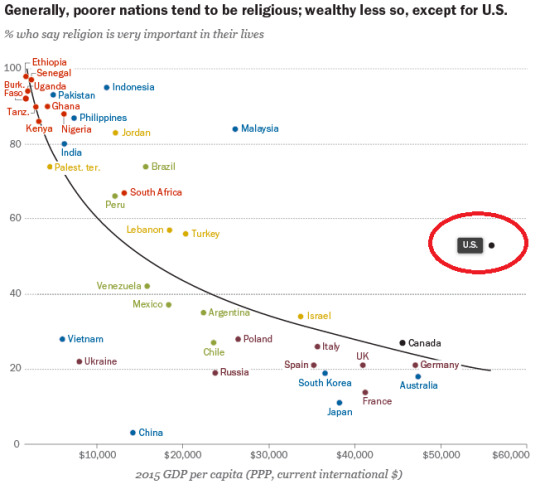
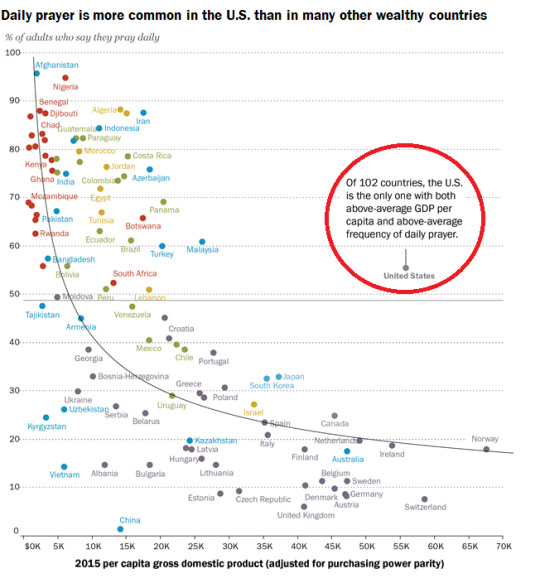
Americans are living through a sociocultural transition unprecedented in our history. For many years, the United States has bucked a global trend of secularization. As countries industrialize and become wealthy, their citizens care less about religion – except for Americans.
The U.S. has stayed so religious for so long for many reasons, but one of the most important has been American religion’s historical distance from politics. Decisions by the “founding fathers” deserve plenty of criticism, but one of their best decisions was to oppose a national church.
“The famous Frenchman Alexis de Tocqueville, who visited the United States in the 1830s,” explained why European Christianity lost its influence then and American Christianity is losing its own: “Famously, he attributed the strength of American religion to its distance from politics.” The further religion stayed away from politics, the stronger it remained. European religion lost power, per Tocqueville, because “religion allied with power was inevitably tainted by factional political interests.”
Let’s fast-forward to modern times. In the late 20th century, the Republican Party realized that it could gain political power by whipping up Christian evangelicals’ hatred of (among other things, like racial integration) the rising social tolerance of sexual freedom. Opposition to these changes catapulted Ronald Reagan to power in 1981 on a wave of the new “Moral Majority,” a coalition of reactionary Christians who wanted the government to legally enforce conservative Christian values on the nation. Since then, the “Christian Right” has remained the most powerful force in the Republican Party.
Background pt. 2: The Future Strikes Back
Main source and further reading: “The Christian Right Is Helping Drive Liberals Away From Religion” from FiveThirtyEight
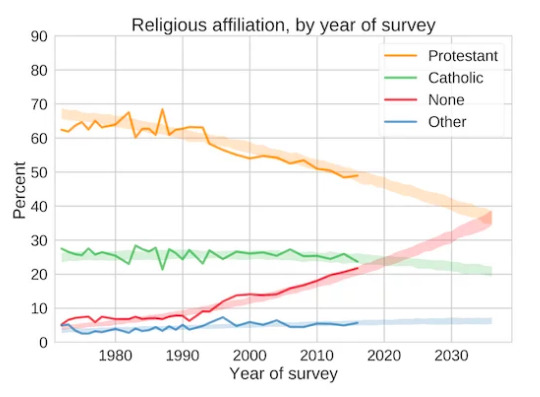
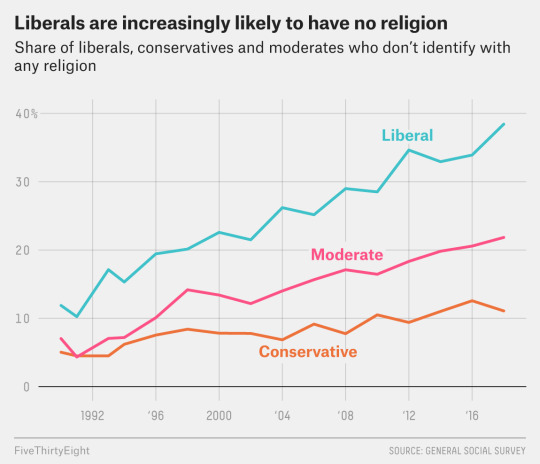
For the last 30 years, non-Republican Americans have grown increasingly disgusted with how Christianity merged with Republican politics. Moderates, liberals, and progressives have fled Christianity in record numbers, leading to the highest level of nonreligious Americans in history.
The straw which broke the camel’s back was marriage equality. In states where Christian conservatives caused more public controversy over gay marriage, nonreligion rose faster. Younger generations, the Millennials (born ‘81-‘96) and Gen Z (born ‘97-‘12), overwhelmingly approve of marriage equality – partly because an unprecedented percentage of us identify as LGBT+, and partly because most of us who don’t at least know a friend or family member who is LGBT+.
“The younger generation, Americans under the age of 30 — more than eight in 10 of them support same-sex marriage…[It's] a litmus test issue for many millennials in the country. It’s not just that conservative white Christians have lost this argument with a broader liberal culture. It’s that they’ve lost it with their own kids and grandchildren.” –Robert P. Jones
Generational warfare strongly shapes American political discourse, where young Americans are much more likely to be secular progressives who support LGBT+ rights, and older Americans are much more likely to be conservative Christians who do not.
That brings us, finally, to Noelle Stevenson and She-Ra.
Noelle Stevenson Tells the Ex-Christian Story
I couldn’t exclude this absolutely amazing image by @horde-princess:
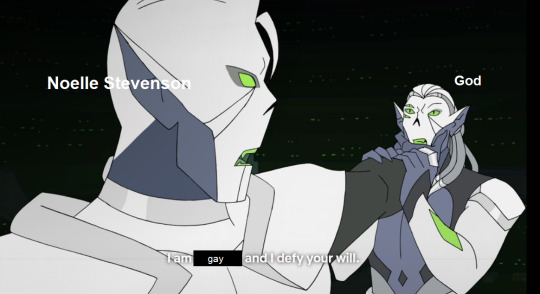
Noelle Stevenson was raised in a fundamentalist Christian household. Her family taught her that homosexuality conflicts with “God’s plan” for people’s lives, and that some people are born destined to suffer in hell. At her fundamentalist Christian high school, Noelle took a class in apologetics learning how to argue in defense of evangelical Christianity. One of the “facts” she learned is that listening to "Stairway to Heaven” causes demonic possession. Yes, really.
As Noelle grew up, her family’s religion’s strict control over her mind began to crumble. To quote the goddess of she-ra religion posts @horde-princess, “Noelle describes herself going off to college and having her eyes opened, meeting gay people for the first time in her life, and realizing that they weren’t amoral devil worshippers like she was raised to believe.” Struggling with her own gay feelings, she eventually came to accept them and marry the woman she loved.
In a recent Q&A (and many other times), Noelle has described projecting herself into her characters so much that fan analysis reveals aspects of herself she never realized. She poured her experience into She-Ra, and thousands of (especially LGBT+) fans who grew up in strict Christian households saw their own struggles playing out on the screen. I suspect this relatable quality drove part of the show’s popularity and its staying power.
She-Ra is becoming a cultural phenomenon, building on the success of other LGBT+ friendly family cartoons like Steven Universe to spread its messages around the U.S. and the rest of the world. Netflix does not release viewership numbers, which makes it difficult to judge She-Ra’s popularity. But an unpopular show would not have enough fans to trend again and again on Twitter demanding a sixth season and/or a movie. She-Ra is not going away – but Christian hegemony is.
Save the Future
We can overcome the Christian Right Horde.

The more that people watch She-Ra, the more they are exposed to its message that LGBT+ love is a positive good against the evil forces of self-shaming religious imperialism. Kids who grow up with She-Ra will hear Christians using Horde Prime’s language to oppose LGBT+ rights, and will learn to fight the Horde in their own country: the Christian Right.
After selling their proverbial souls to the Christian Right decades ago, Baby Boomers and the Silent Generation are waking up in an America that they do not own anymore. This panic led them to hide behind Trump, hoping that he could fight back against the cultural tide. But Trump has only alienated moderates, liberals, and progressives further from Christianity. His divisive, hateful, reactionary rhetoric can only accelerate the already-exponential rise of nonreligion in the United States. When the Christian Right accepted Trump as their savior, they surrendered their future.
By turning the United States against itself and giving the fossil fuel industry free reign to wreck our environment, Trump and his worshippers are determined to destroy the future before the post-Christian generation can claim it for ourselves. Noelle Stevenson and her masterpiece show She-Ra are a near-perfect figurehead for our generation’s resistance against rising suicide-cult tendencies of the Christian Right. We can fight back, and She-Ra shows us how: with love and forgiveness to those who are willing to change, but with strength and bravery against those who want to force us back into the closet and back into the strictly-controlled dogmatic cult of American evangelical Christianity.
36 notes
·
View notes